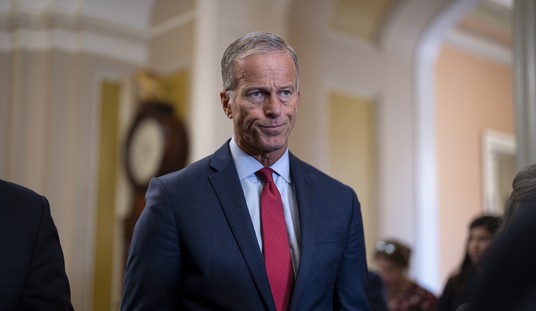
Vox.com has published an “analysis” claiming that Republican-run states could legally just abolish the popular vote in presidential elections. It is obvious from the fact that this was actually published, and has not been corrected three days later, that neither the author, Vox Executive Editor Matthew Yglesias, nor anybody else in the site’s editorial chain has read the Fourteenth Amendment.
Yglesias starts out his post, alarmistly entitled “A totally legal, totally shady way that Republicans could ensure Hillary Clinton’s defeat,” by warning darkly:
Democrats have been consoling themselves with the idea that the 2016 election is likely to look a lot more favorable to them than 2014 did. And that’s true. Unless Republicans use their unprecedented sweep of state legislatures to change the rules and guarantee a victory for the GOP.
After a desultory whack at the perennial discussion of the (perfectly Constitutional, but flawed in other ways) possibility of having states give out electoral votes by Congressional District (as is done in Nebraska and Maine), Yglesias concedes that this is unlikely to happen. But at this point, with a post consisting of little over 300 words, a few charts, and a threat that doesn’t live up to the post title’s grim warning, Yglesias goes off the rails (screenshotted because you always screenshot Vox before they re-edit their posts):

[T]here’s nothing requiring Michigan (or any other state) from holding a presidential election at all. The state legislature could simply allocate its electoral votes to Mike Pence (or whomever) and tell angry liberals they should have thought about that when they decided not to turn out for the midterms.
Now first of all, “requiring…from holding”?

But that quibble aside, if you’re not familiar with the Constitution, you’re probably wondering right now why nobody has tried this before, in the long, dark history of partisan shenanigans. Actually, before about 1828, several states handed out electors this way, and South Carolina did so until the Civil War – so hey, why did that stop? Anyone who has read Section 2 of the Fourteenth Amendment can tell you the answer, because it is right there in black and white:
Section 2.
Representatives shall be apportioned among the several states according to their respective numbers, counting the whole number of persons in each state, excluding Indians not taxed. But when the right to vote at any election for the choice of electors for President and Vice President of the United States, Representatives in Congress, the executive and judicial officers of a state, or the members of the legislature thereof, is denied to any of the male inhabitants of such state, being twenty-one years of age, and citizens of the United States, or in any way abridged, except for participation in rebellion, or other crime, the basis of representation therein shall be reduced in the proportion which the number of such male citizens shall bear to the whole number of male citizens twenty-one years of age in such state.
(This provision would presumably extend as well to denials of the right to vote to women and people between 18 and 21 after the passage of the Nineteenth and Twenty-Sixth Amendments, not that it would matter if the state legislature cancelled an entire presidential election)
So, if a state with a Republican legislature and Governor were to do this, even aside from the political consequences, there is indeed something rather significant that ensures it could not “simply allocate its electoral votes” to the Republican candidate, because there would be essentially no electoral votes to allocate after having denied every single citizen of the state the right to vote. Yglesias’ entire thesis is nonsense.
What makes this an especially egregious failure is that Yglesias only three weeks ago published an essay (rehashing an argument he’d been making since 2011) on why the Constitution should be amended to create an individual right to vote, an essay that drew favorable commentary from the usual suspects on the Left – Ed Kilgore, Steve Benen, Brian Beutler, Scott Lemieux. The idea is actually being pushed by two left-wing Congressmen, [mc_name name=’Rep. Keith Ellison (D-MN)’ chamber=’house’ mcid=’E000288′ ] of Minnesota and [mc_name name=’Rep. Mark Pocan (D-WI)’ chamber=’house’ mcid=’P000607′ ] of Wisconsin. You would think that anyone writing on this topic to the point of promoting an amendment to the Constitution would actually have read what the Constitution already says on the topic.
[UPDATE, in the interests of completeness, and as a reminder that I should probably have explained the caselaw in this area: Yes, in 1892 the Supreme Court in McPherson v. Blacker preserved a good deal of latitude for states to determine how they select electors, and there is dicta in Bush v Gore and in McPherson suggesting that states could still revert to having electors selected by the state legislature, on the theory that the Fourteenth Amendment does not actually amend Article II. McPherson, however, dealt only with the method of selection that exists now in Nebraska and Maine, i.e., selection in districts rather than by statewide ballot. Neither case dealt with the selection of electors without an intervening election in which the voters select the electors, either directly or indirectly. McPherson, moreover, while it contains a compelling originalist analysis of Article II, gives rather painfully short shrift to the meaning of the Fourteenth Amendment.]
Once upon a time, Yglesias was regarded – by people other than his personal friends and hard-left partisans, if that’s not redundant – as one of liberalism’s serious young writers. Yglesias now writes at Vox after a long string of short stints at other outlets over the past decade; as his own bio on the site recounts:
It all started at The American Prospect, then there were stints at The Atlantic and Think Progress, a troll-tastic run at Slate, and now it’s Vox, Vox, Vox all the time.
These days, however, his role at the lavishly funded startup famous for its need to correct nearly everything it posts seems to be to provide a regular source of clicks to see what he has gotten outlandishly and obviously wrong this time, even gaps in his knowledge a simple Google search could fix – not the occasional error that can afflict any writer, but one colossal error after another that undermines the entire point of things he writes. That makes me sad, actually, because Yglesias isn’t stupid, and he has enough intellectual curiosity to ask a lot of counterintuitive questions, and I enjoy sparring with people on the other side who have something to say (leave aside that he blocked me on Twitter, which is somewhat symptomatic of this descent into straight-up trolling). But over and over, he gets an idea and writes it up without doing any sort of investigation to see what he might be missing. And he compounds this, not with even a little humility about his constant errors, but with totally unearned sneering condescension at the intellect of his opponents, as if asserting that you are more intelligent than other people is an adequate substitute for demonstrating it:
Some day I will write a list of conservative writers who I respect. It will be a short list.
— Matt Yglesias (@mattyglesias) February 3, 2010
Contra Gerard Alexander, most liberals are not nearly condescending enough to conservatives.
— Matt Yglesias (@mattyglesias) February 9, 2010
I think I haven't posted enough recently on the "Jonah Goldberg is dumb" theme. I assume it's still true: http://ygl.as/dzgGKC
— Matt Yglesias (@mattyglesias) April 6, 2011
Is Bobby Jindal’s reputation for intelligence anything other than ethnic stereotyping?
— Matt Yglesias (@mattyglesias) June 18, 2013
The fact that a writer with this m.o. continues to be employed by Vox without embarrassment – in the position of Executive Editor, no less – is a sign that the site really is more interested in getting train-wreck-gawking traffic than in any sort of contribution to intelligent debate.












Join the conversation as a VIP Member